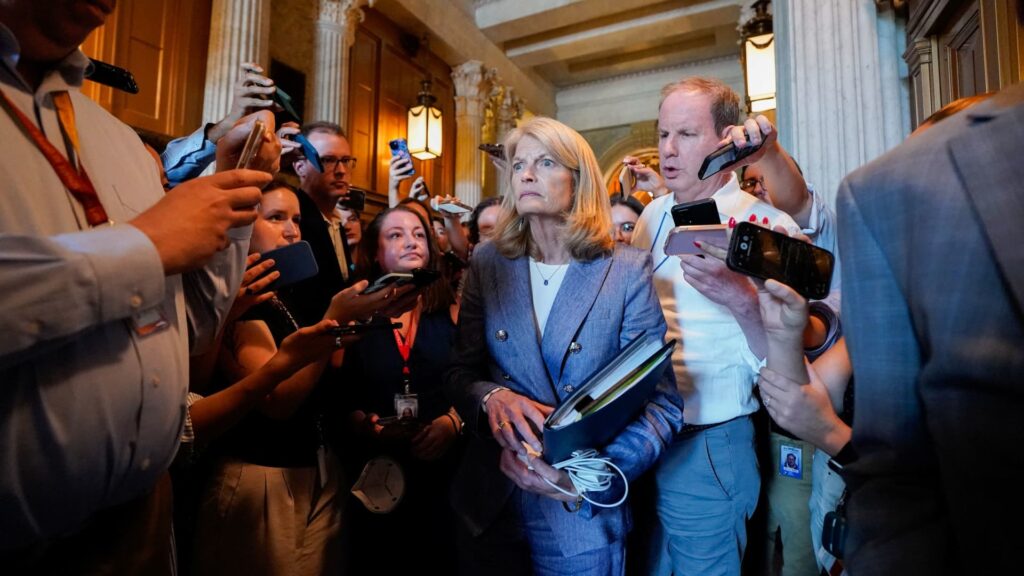
U.S. Senator Lisa Murkowski of Alaska played a pivotal role in the passage of President Donald Trump’s sweeping tax-and-spending bill on July 1, 2025. The legislation, which has sparked significant controversy, was passed by the GOP-controlled Senate with Murkowski’s critical vote. Her support came after securing a crucial carveout for her constituents, addressing one of the bill’s most stringent new provisions.
“Do I like this bill? No. But I tried to take care of Alaska’s interests,” Murkowski stated in an interview with NBC News’ Ryan Nobles. “I advocated for my state’s interests, I will continue to do that and I will make no excuses for doing that,” she added, following her decisive ‘yea’ vote that allowed Vice President JD Vance to cast the tie-breaking vote.
Alaska’s Interests at the Forefront
Murkowski, known as a moderate Republican, has often been a vocal critic of Trump. Her concerns about the bill included its provisions to cut the Supplemental Nutrition Assistance Program (SNAP), commonly known as food stamps. According to the Center on Budget and Policy Priorities, one-tenth of Alaskans received SNAP assistance in 2024, highlighting the program’s importance in the state.
Moreover, Alaska holds the nation’s highest SNAP payment error rate, as reported by the U.S. Department of Agriculture. Despite these concerns, Murkowski ultimately backed the bill after negotiating last-minute benefits, such as increased funding for rural hospitals and a specific exemption for Alaska from SNAP cuts.
“The final Senate bill exempts states with the highest SNAP error rates from the cuts for two years.”
Political Dynamics and Reactions
The bill’s passage in the Senate was marked by a narrow 51-50 vote, with Vice President JD Vance casting the deciding vote. Notably, three Republican senators—Susan Collins of Maine, Thom Tillis of North Carolina, and Rand Paul of Kentucky—joined all Democrats in opposing the bill.
Rand Paul criticized the GOP leadership’s tactics, suggesting that their final deliberations involved a choice between “dealing with me and reducing the debt ceiling or giving pork and subsidies to Alaska.” He further remarked, “They chose to add more pork and subsidies for Alaska to secure that.”
Murkowski responded to Paul’s critique, which was framed as her vote being “a bailout for Alaska at the expense of the rest of the country.” She retorted, “I have an obligation to the people of the state of Alaska, and I live up to that every single day.”
Implications and Next Steps
The legislation now heads back to the House for a final vote. If approved, it will proceed to President Trump’s desk for signing into law. The bill’s passage represents a significant legislative victory for the Trump administration, albeit amid considerable controversy and division within the Republican Party.
Murkowski’s actions underscore the complexities of political negotiations, particularly when balancing national interests with those of individual states. Her efforts to secure benefits for Alaska reflect a broader trend of lawmakers prioritizing local needs in national legislation.
As the bill moves forward, its implications for both Alaska and the broader United States remain a topic of intense debate. The carveouts and provisions negotiated by Murkowski may set a precedent for future legislative negotiations, highlighting the intricate dynamics of political compromise.
In her statement, Murkowski emphasized her commitment to improving the bill for Alaska, while acknowledging its shortcomings for the rest of the nation. “My goal throughout the reconciliation process has been to make a bad bill better for Alaska, and in many ways, we have done that,” she wrote on social media.
“While we have worked to improve the present bill for Alaska, it is not good enough for the rest of our nation—and we all know it.”
The coming weeks will reveal the bill’s fate and its impact on both the national landscape and the state of Alaska, as lawmakers and constituents alike grapple with its broader implications.






